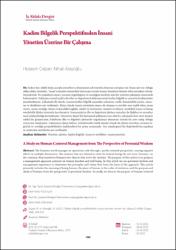| dc.contributor.author | Çırpan, Hüseyin | |
| dc.contributor.author | Alayoğlu, Nihat | |
| dc.date.accessioned | 2022-11-01T10:34:56Z | |
| dc.date.available | 2022-11-01T10:34:56Z | |
| dc.date.issued | 2022 | en_US |
| dc.identifier.citation | Çırpan, H. ve Alayoğlu, N. (2022). Kadim bilgelik perspektifinden insani yönetim üzerine bir çalışma. İş Ahlakı Dergisi, 15(1), 184-220. https://doi.org/10.12711/tjbe/m3738 | en_US |
| dc.identifier.issn | 1308-4070 | |
| dc.identifier.issn | 2149-8148 | |
| dc.identifier.uri | https://doi.org/10.12711/tjbe/m3738 | |
| dc.identifier.uri | https://hdl.handle.net/20.500.12511/9903 | |
| dc.description.abstract | Sadece kâr odaklı bakış açısıyla yönetilen iş dünyasının çok boyutlu olumsuz sonuçları var. İnsan için var olduğu iddia edilen sistemler, “insan”a hizmet etmemekte hatta tam tersine insanı, kendisine hizmet eden nesnelere dönüştürmektedir. Bu makalenin amacı, insanın özgürlüğünü ve esenliğini merkeze alan bir yönetim yaklaşımı önerisinde bulunmaktır. Yaklaşıma temel teşkil eden ilke ve değerlerin belirlenmesinde kadim bilgelik ve yönetim birikiminden yararlanılmıştır. Çalışmada ilk olarak, insanın kadim bilgelik açısından anlamına, varlık düzenindeki yerine, amacına ve ideallerine yer verilmiştir. İkinci olarak insani yönetimin amacı ele alınmış ve modele esas teşkil eden; insan onuru, insan esenliği, düzen ve karşılıklı bağlılık, adalet ve merhamet, emanet ve ehliyet, süreklilik inancı ve hesap verebilirlik ilkeleri üzerinde durulmuştur. Sonrasında bu ilke ve değerlerin işletme unsurları ile ilişkileri ve unsurları nasıl yönlendirdiği tartışılmıştır. Literatüre dayalı bir kavramsal yaklaşımı esas alan bu çalışmada ben-ötesi misyon sahibi bir girişimcinin, belirlenen ilke ve değerleri işletmede uygulamaya almasının önemli bir yere sahip olduğu sonucuna ulaşılmıştır. Çalışmanın alana katkısı, birbirlerinden farklı alanlar olarak ele alınan unsurları, insanın özgürlük ve esenliği perspektifinden ilişkilendiren bir şema sunmasıdır. Son olarak genel bir değerlendirme yapılmış ve araştırma önerilerine yer verilmiştir. | en_US |
| dc.description.abstract | The business world manages its operations only through a profit-oriented perspective, causing negative effects in multiple dimensions. The systems that are claimed to exist for human beings do not serve ‘humans’, on the contrary, they transform humans into objects that serve the systems. The purpose of this article is to propose a management approach centered on human freedom and well-being. In this article we use perennial wisdom and management experience to determine the principles and values that form the basis of the approach. This article primarily includes the meaning of being human, the place of human in the order of existence, and the purpose and ideals of humans from the perspective of perennial wisdom. Secondly, we discuss the purpose of human-centered management and the concepts that form the foundation of the model, namely, human dignity, human well-being, order and mutual dependence, justice and mercy, trust and worthiness, belief in afterlife and accountability. Afterwards, we address how these principles and values are related to business elements and how they give direction to these elements. In this study with a literature-based conceptual approach, we conclude that an entrepreneur with a transpersonal mission has an important role in applying the determined principles and values in the business. As a contribution to the literature, this paper presents a schema from the perspective of human freedom and well-being, and link the elements which were regarded to be in different areas. Finally, we make a general discussion and recommendations for future research. | en_US |
| dc.language.iso | tur | en_US |
| dc.publisher | İktisadi Girişim ve İş Ahlâkı Derneği | en_US |
| dc.rights | info:eu-repo/semantics/openAccess | en_US |
| dc.subject | Yönetim | en_US |
| dc.subject | İşletme | en_US |
| dc.subject | Kadim Bilgelik | en_US |
| dc.subject | İnsan ve Özellikleri | en_US |
| dc.subject | İnsani Yönetim | en_US |
| dc.subject | Management | en_US |
| dc.subject | Business | en_US |
| dc.subject | Perennial Wisdom | en_US |
| dc.subject | Human and Human Features | en_US |
| dc.subject | Human-Centered Management | en_US |
| dc.title | Kadim bilgelik perspektifinden insani yönetim üzerine bir çalışma | en_US |
| dc.title.alternative | A study on human-centered management from the perspective of perennial wisdom | en_US |
| dc.type | article | en_US |
| dc.relation.ispartof | İş Ahlakı Dergisi | en_US |
| dc.department | İstanbul Medipol Üniversitesi, İşletme ve Yönetim Bilimleri Fakültesi, İnsan Kaynakları Yönetimi Bölümü | en_US |
| dc.authorid | 0000-0002-7554-5203 | en_US |
| dc.authorid | 0000-0003-2736-4448 | en_US |
| dc.identifier.volume | 15 | en_US |
| dc.identifier.issue | 1 | en_US |
| dc.identifier.startpage | 184 | en_US |
| dc.identifier.endpage | 220 | en_US |
| dc.relation.publicationcategory | Makale - Ulusal Hakemli Dergi - Kurum Öğretim Elemanı | en_US |
| dc.identifier.doi | 10.12711/tjbe/m3738 | en_US |
| dc.institutionauthor | Çırpan, Hüseyin | |
| dc.institutionauthor | Alayoğlu, Nihat | |
| dc.identifier.trdizinid | 533398 | en_US |


















